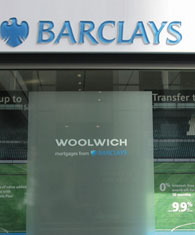Barclays has attempted to head off a shareholder revolt over the £17.7m package awarded to its chief executive, Bob Diamond, by offering to amend the terms of his annual bonus. On Thursday, the bank issued a surprise statement to the market, saying it recognised the “strength of opinion expressed by some shareholders” and would put in place new performance targets for Mr Diamond and other senior executives of the bank. After what it said was “extensive engagement” with major investors, Barclays agreed that half of Mr Diamond’s £2.7m bonus for 2011, which pays out over three years, should be subject to an additional performance hurdle that will mean it only pays out in full when the bank’s return on equity exceeds its cost of equity.
Christine Lagarde has piled the pressure on Britain and the US to increase their contributions to the International Monetary Fund ahead of a series of decisive meetings on Friday. Ms Lagarde, the IMF managing director, has set a target of at least doubling the fund’s resources to $800bn (£498bn) to help stabilise the global recovery. Speaking at the start of the IMF spring meeting in Washington, she said: “I hope that the entire membership will seize the moment.” On the UK, she added that it was “in their interest” to commit more funds. Chancellor George Osborne is expected to agree on Friday to provide at least another £10bn of taxpayer money to the global economic watchdog, but has yet to make a final decision. Britain has already pledged £30bn to the IMF.
Manufacturers’ financial health has dramatically improved over the past year, with experts predicting the sector could “drive the UK’s recovery”. Parts of the sector have shown 73% fewer signs of distress – such as county court judgments and late filing of accounts – at the start of 2012 compared with the same period last year, research has found. Begbies Traynor’s quarterly “Red Flag Alert”, which monitors the warning signs of distress in companies, said indications of financial problems fell by 17% across all sectors in the first three months of this year compared with the first quarter of 2011, and manufacturers were the “star” performers.
The Times.
An insurer that protects customers against leaky pipes and broken boilers has been fined £750,000 for making excessive silent or abandoned calls. The communications regulator said that HomeServe had breached its rules on dropped calls on 42 separate occasions in February and March last year. The penalty is the largest fine for silent calls that has been levied by the regulator since it took on greater powers in September 2010. An estimated 14,756 calls were made to consumers who were met with silence or were hung up on during the period, Ofcom said.
The determination to find new blockbuster drugs has encouraged Glaxo Smith Kline to bid $2.6 billion for a company that it admits has uncertain prospects. GSK has offered to buy its long-term partner Human Genome Sciences for $13 a share, an 81 per cent premium to the previous day’s price. The companies have created drugs together since Human Genome was founded 20 years ago. GSK wants to reduce costs and squeeze the full benefit from their products. Human Genome, based in Maryland, said that it had rejected the approach but had initiated a strategic review. GSK has been invited to take part in that process — a move that puzzled Wall Street yesterday. The assumption was that GSK would get its way at a higher price. Human Genome’s share price doubled to $14.44 in morning trading in New York. “We believe that a takeout from GSK makes strategic sense,” analysts at Barclays Capital said.
The Scotsman.
Insurance giant Aviva unveiled a boardroom shake-up yesterday that will see UK head Trevor Matthews taking charge of the group’s major developed markets and another high-profile director leaving the company. The major casualty is the highly regarded Igal Mayer, who loses his job as head of the insurer’s European business, which generated nearly 40% of Aviva’s operating profit last year. “That is bearish. Igal is a loss,” Kevin Ryan, insurance analyst at broker Investec, said. “He has always been viewed as a very safe pair of hands who was very good at operational things.” Among a raft of other changes, Aviva group chief executive Andrew Moss has replaced the regional management layer of its structure with a new dual template based around developed and higher-growth markets.









